- Home
- A. A. Attanasio
p1b6fn7sdh1ln0g4v1pkvkuqim54 Page 10
p1b6fn7sdh1ln0g4v1pkvkuqim54 Read online
Page 10
Joining it at a right angle, the via principalis retained
much of its stately grandeur as it entered the central range, an open, paved courtyard flanked by colonnades. The chief buildings there looked grand even in decay, and although the red roofs had crude timber patches where tiles were missing, and vines scribbling the walls choked themselves with neglect, they did indeed suggest a sunnier clime and bygone glory.
They passed the tribunal, the long hall where the
commander would stand to address the troops, and
Lailoken glanced past its cracked and chipped facade to the aedes, the shrine that housed the deity.
Instead of a statue of the emperor, the Celts had
erected a stone sculpture of a strong, fang-mouthed
woman fierce in her nakedness, wearing a skull-necklace and gripping a sword in one hand, and a severed head in the other, fountaining blood.
"Kali," Lailoken said to himself, recognizing this figure as the Black One—the Demon Queen of Indus.
During his time as a demon, many centuries ago, he
accompanied the white tribes of the north who carried the worship of this cannibal ogress across this sea to the western islands.
There in the west, he knew, she was still worshiped
as the sacred sow that eats her farrow. "Ah me, what a deity!" he said aloud in Latin, frowning with concern and speaking to no one in particular. "Even the Furor knows this mask of Her as Hel, the female maw that consumes all the living. She is the cosmos—she is physical reality—she is the raging body of the universe that births mortals and then tears us apart."
"Silence your incantations, wizard!" a soldier yelled at him in Brythonic. "Silence or lose your head!"
The military escort led the old wizard around the
principia, a basilica with elegant stone stairway and pillars, past wooden buildings on stilts—the fort granaries—to a second transverse road. They trudged beside dormant
workshops to a walled garden of bright blossoms. There, the guards peeled away, and he was left alone.
For a while, he simply stood there, waiting, looking
at the cultivated flowers around him, all blue: aconite, iris, hyacinth, larkspur, delphinium, gentian, cornflowers, all blue as fallen pieces of the sky.
He stood there patiently, content after the long walk to stand still and breathe deeply of these heady floral fragrances.
*
By now the demon's patience has thinned, and he
feels inward to the cosmic power within himself.
Immediately, he senses the nearby presence of the
unicorn.
He steps around the walled garden of blue flowers
into a lush orchard of old and sinuate fruit trees espaliered across long, wide walls of ancient masonry. Deceased
gods frolic in the stonework, peeking out from behind leafy boughs and from footstones beneath overarching grape
trellises.
The sky's bright eyes staring through broad leaves
cast a liquid light over seed-frames, compost heaps, and brilliant plots of flowering herbs. Before him, in a lane of hedges, the unicorn stands, elegant as snow.
Lailoken veers toward it, and the slender creature
flies sideways, its tail and mane streaks of cirrus. It prances away from the arbors and trellises and crosses a distant field bright as a star, bright even in that brash sunlight.
Farther into the arboretum, among glowing masses
of flowers, the child Morgeu sits on a tall stool. A sparkling flotage of seed tufts fills the air behind her. There, a tall, wide-shouldered woman boils something in a pan on a
brazier. Fumes swirl about the silhouette, and a serene fragrance of myrtle and pine needles colors the shady enclosure.
The shadowy woman dismantles a dense spiraea, a
queen of the meadow, whose floral tufts drift in the morning breeze as she cuts them free. Into the boiling brew, select cuttings slip, and the vapors thin away, revealing a woman of striking beauty. Tawny, sleek, with a broad nose and wide jaw, she bears a soft likeness to a lioness.
Her hooded green eyes assess him with burning icy
elation, as with joy after long separation. She wears her bronze hair intricately braided atop her head, and her clingy, green gwn, a silken Celtic skirt, covers her to her ankles and leaves her breasts bare.
Lailoken averts his eyes, afraid he is not meant to
see her thus exposed, and Morgeu's glittery laugh mocks him. "Look, Mother," she speaks in Brythonic, "he must be Christian, after all. He cannot bear the sight of your womanhood."
With firm, svelte command, she says, "Morgeu, you may be on your way now."
"Mother! He is my prize."
"Be on your way, darling," she repeats, without budging her vivid eyes from the demon visitor. "And don't try spying on us through the trellis or, by the Good-Mother-of-us-all, you'll be too sore to ride for a week."
With a petulant toss of her head, the girl hops from
the bench and strides purposefully from the arboretum, pausing before Lailoken just long enough to wince her eyes and flare her nostrils menacingly.
"I'm asking you to forgive my daughter her
impertinence, Lailoken," the woman says in a kindly voice of Gaelic-accented Latin. Her gaze intently fixed on the lanky, old man, she identifies him from her visions, the demon-man she has glimpsed many times in trance,
replete in every detail, from his strange quartz eyes to his tangled beard and animal skins.
"Morgeu has all the hauteur of her Roman father
and none of the Celtic hospitality of her mother's people,"
she continues, gesturing to a stone bench alongside
several tripods of hot braziers and boiling fragrances.
"Please, take a seat with me."
Lailoken stares and does not move. He has
journeyed a long way following the unicorn, and he does not understand why the radiant beast has led him here.
"Is it my attire offends you?" the queen inquires, gesturing to her topless gwn and her full, young breasts filled with their own pink light. "It is the summer custom of my people to dress thus. Clearly, though, you are from a far different tribe." Off a worktable cluttered with phials of colored glass and flowery cuttings, she removes a sheer, coraline robe and pulls it around herself. "Did you see the unicorn when you came in?"
"It ran into the field," Lailoken says.
"Morgeu told me that you frightened it last night."
She speaks while using wooden tongs to dip phials in a percolating brew, coating them inside and out, then placing them in a drying rack on the worktable. "That surprised me, because each time I've seen you in my waking dreams
over the years, you are with my unicorn. I had hoped you could steady its head while I draw a teardrop or two. The feather I use to make it blink doesn't hurt, but it makes it jumpy and I spill more than I like."
Lailoken leans on his staff and peers into the fleeing vapors, searching for invisibles. The tattered air stands empty. "Your unicorn?" he queries. "The creature is yours?"
She removes the last phial and casts a handful of
grains in the brew that thickens the air with frosty smoke and rainy smells of soaked meadows and dripping fir
forests. With a blush to her features, she turns her
attention to arranging phials on the work-table. "Of course, I don't own the unicorn. It came to be mine when I was a young woman, and it brought prophecy with it."
She takes pruning shears from a faldstool beside
the worktable and positions her chair to face her visitor
from the shade. "I think of it as mine, because when I call, it comes." Sitting placidly, leaning to one side, legs crossed under her robe, she beams at the demon as if he were an old acquaintance. "It's not me we should be talking of. It is you. You are actually here now. After all these years. I remember seeing you in trance years ago, when vision first opened fo
r me."
"Then you know who I am?"
"Morgeu told me your name," she answers, eyes green as the unicorn's and nearly as bright. "I have long known you are not human. You are a demon. You are from the House of Fog. The Furor summoned you and others
like you out of the Gulf—and you alone fell to earth. The unicorn and the Annwn, the Fire Lords, fashioned you this body."
Lailoken nods. "This is so. You know of me. Yet I do not know of you."
"I am Ygrane, queen of the Celts." An air of melancholy thickens about her. "My story is not as grand as yours, for all that I am I have come to by accident and error. By accident of birth, I inherited a dying kingdom. And by error, I took a Roman husband, whose issue found you in our woods."
"You must have been a child—" Lailoken interrupts.
"Yes. My marriage to the dux Britanniarum proved a childish mistake. I was fourteen when my Druids, my
counselors, pressed by political expediency, urged me to marry. I tried running away when I was fifteen. But they found me and brought me back. This is my twenty-second summer."
"I have encountered few queens in my travels," the demon says. "You are rare."
Ygrane accedes with a sigh. "It is true. Many chiefs, few queens. In my grandmother's grandmother's great-grandmother's time, many years had already passed since the Celts abandoned the ancient ways—the worship of
Mother and the queen. Unwisely, the kings of our past emulated Roman ways. They granted power to
administrators. In time, those clients refused to return that power to their rightful sovereigns. They seized regency for themselves, and civil war has been a sad fact of Celtic life for generations now. Worse, the Christians teach that the old ways are evil, and so I am losing influence with my own people."
"Yet the gods give you power," Lailoken says.
"This is so," she admits. "The Daoine Sid have blessed me, by choosing my soul for this life. I was a common child in a remote hill clan, set apart from others by the gift of sight that comes with me from former lives. I've
seen visions of the Goddess. I have spoken with the pale people and the horse of one horn since before I could talk.
All my life, I have seen little pieces of the future. When the Druids learned of me, I was taken from my family and
reared to be queen. You I have seen in the trance flame, many times."
"Prophecy is a tricky gift, my lady," Lailoken says.
"Tricky—yes, it is tricky," the queen agrees. "Many of my own people would put out my eyes for what I see.
The Christians, I mean. Their faith forbids prophecy and condemns to an eternity of suffering all prophets and those who bear magic."
"Is that the sadness I sense in you, then?" Lailoken dares to ask.
"As a child, when the Druids came to take me away from my mother, I cried. I was happy in my humble home in the hills. Our floors were stamped earth— we ate berries in summer and root broth in winter—yet I had no worry or concern. The faerie played with me, and the Goddess was my friend. I cried bitterly to leave those woods and
hedgerows, where first I knew happiness with the elf-folk.
But the Druids told me a story, you see. They said that it was a very old story, whose time had come to be fulfilled. A Celtic woman beloved of the Sid would someday marry a foreign king, and a child would come to them who will grow up to be a greater king than any of either tribe before. He will save his two peoples from tragedy." She smiles thinly, as if appreciating the foolishness of this tale. "They said I was that woman—and the savior would be my child."
The small hairs all over Lailoken's body stand on
end. "M-my mother told me the same," he stammers.
"About a queen foretold to marry her enemy and birth a noble king destined to unite us.
She dips her head wearily. "I believed that once.
The Druids used that fable to take me from my home.
Since then, I have lived in these old Roman forts where the pale people are loath to come. For political advantage, the Druids married me to Gorlois, duke of the Saxon Coast."
With a wry, hurt look, she lifts her face. "I was young, of course, and disoriented by my new life, a life of
handmaidens and soft, pretty clothes. I lost touch with my visions. Soon after, I was married and heavy with child.
And then I saw—and what I saw, I wept for and have been weeping for ever since. Gorlois is not the one—and
Morgeu—" Her face hardens, and her voice grows cold.
"Morgeu is her father's daughter. He has encouraged and abetted arrogance in her. She does not have the sight. Oh, I can try to discipline her, for now, but I've not the grace or strength to make her other than the arrogant soul she is.
She is no one's savior."
"Perhaps you will have a new vision," the demon consoles. "You must look again."
"I have," she admits, blinking away the remoteness from her eyes. "I have looked, Lailoken, and I have seen him in my trances—a king with yellow eyes and raven hair.
Yet, I fear I deceive myself. So, I inquired of others who see better than I, and they assure me that my long sight is true. I am wanting to believe. I am wanting a destiny. For this story must be true—or else my soft life in these fine clothes and old palaces is empty, a joke."
"Then, the king of legend will come to you," the old man insists.
"My life is filled with waiting and more waiting—for something that may never be." She looks down at the worktable. "I spend the time making these rinses—special waters that hold spells. I do it for my people. The farmers use them for their crops and flocks, the women for healing balms. I'd go mad without this work."
"Blessedly," Lailoken speaks up, "you do not wait alone. The able men of this fort are devoted to you."
"Yes," she confirms, raising her squared, lioness chin proudly. "They are my fiana; they come from each of the clans. They abhor the rivalry that has divided and weakened us before our enemies, and they look to me for a return to the old ways. They are my own people."
The sincerity and sorrow of this beautiful young
woman stir a depth of feeling in Lailoken he has not
experienced since his first days in this world. She reminds him of the earnest presence of his mother. When Optima smiled at him, he first felt love—and he became human.
When this queen looks at him as if she knows him—and he senses somehow that she does, through her magic-sight—
he feels that love renew again, and his humanity stirs.
The queen rises. "I've rambled on about myself and not shown you the hospitality due even a common traveler.
Forgive me. My guards will escort you to a place where you may refresh yourself. Afterward, we will talk again."
Afraid of the hope that the demon's presence stirs in her, Ygrane signals for her guards and turns away from Lailoken before he can speak again.
At the end of the long hall where the Roman
commanders once addressed their troops is a shrine that the queen has erected to the Drinker of Lives. This is the aedes where Lailoken recognized the Demon Goddess of the Indus, Kali. To the young queen, the frightful statue of the fanged goddess with a necklace of skulls is Morrigan, an ancient personification of the Dragon.
Ygrane sits on the pedestal of the shrine, leaning
back against the shin of the cannibal ogress. She listens to the clop of horse hooves on the cobbles of the nearby courtyard. The busy sounds of Dun Mane's cavalcade
preparing to return to Maridunum with Morgeu and Raglaw reverberate in muted echoes through the stone corridors.
They brim her with sadness, for she had hoped to spend more time with her daughter, wanting to instill something of the magical arts in her child before returning her to the stern and martial influence of her father, the duke.
Such motherly concerns disperse as the statue at
her back begins to thrum, signaling the arrival of the Daoine Sid. Light as moths, they enter the dim-lit sh
rine with a scent of rain. They flutter like will-o'-the-wisps, orange flame-flickers packing the air with the unrelieved loneliness of their exile from the Great Tree, the haunting melancholy of the dispossessed.
One of the many sparks filling the chamber
separates from the sunset haze that is their presence and assumes human form. A tall, slender figure appears, and she squints to recognize the familiar countenance of Prince Bright Night.
The elf prince bows respectfully to the queen.
Garbed in green mantle and trousers, a golden tunic and yellow boots, he bears the easy, regal manner of an elven chief. He flings back long auburn locks and faces her with upslanted eyes that bear a green kinship to her own.
"Sister, we must talk."
"Happily, brother. But why have you come with such a mighty legion?"
"We come to take the one called Lailoken—" He pauses briefly and looks deeply into her. "To feed the Dragon."
The queen's eyes show momentary alarm, yet her
voice remains calm. "I understand the Dragon's need.
Even so, brother, we must not squander the demon."
The prince frowns impatiently. "Sister, I have been with Lailoken since he came into our domain. I have seen the Annwn who labored night and day to fit him into a body.
I have seen these Fire Lords, a sight few gods have
beheld—and I tell you, they are astonishing beings. They have packed Lailoken's great power in a human frame. I say, we dare not let such a strong being elude us. He has come here so that we may feed him to the Dragon."
"And I say not. He has come among us to help us in our plight."
"Our plight is the Dragon."
"The Dragon will drink the lives of the Furor's
minions."
Bright Night exhales a skeptical sigh. "Would that
were so, sister."
"It shall be so, brother. I have seen it."
"What you see blows with the winds of time,
sometimes here, sometimes there. If we fail this time, the Dragon will devour us.''
"As you say. We must not fail. That is why I need Lailoken. I assure you, without him, we will not have the skill to steady ourselves against the timewinds that blow the Furor and his tribes to our shores. We need the

 The Conjure Book
The Conjure Book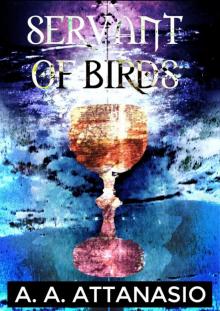 Servant of Birds
Servant of Birds The Eagle and the Sword (The Perilous Order of Camelot Book 2)
The Eagle and the Sword (The Perilous Order of Camelot Book 2)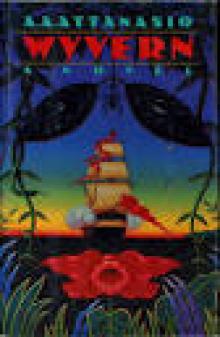 Wyvern
Wyvern The Last Legends of Earth
The Last Legends of Earth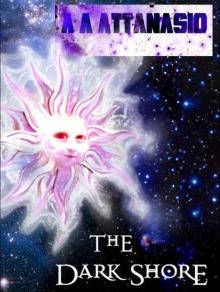 The Dark Shore (The Dominions of Irth Book 1)
The Dark Shore (The Dominions of Irth Book 1)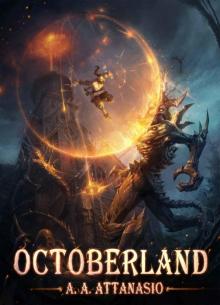 Octoberland (The Dominions of Irth Book 3)
Octoberland (The Dominions of Irth Book 3)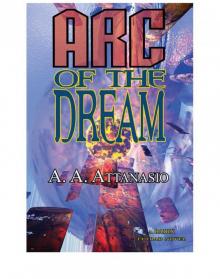 Arc of the Dream
Arc of the Dream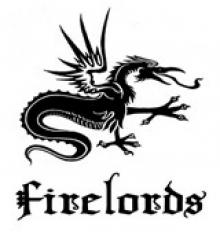 p1b6fn7sdh1ln0g4v1pkvkuqim54
p1b6fn7sdh1ln0g4v1pkvkuqim54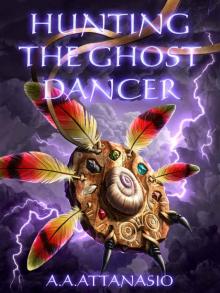 Hunting the Ghost Dancer
Hunting the Ghost Dancer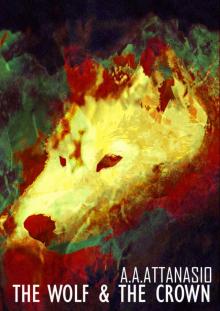 The Wolf and the Crown (The Perilous Order of Camelot Book 3)
The Wolf and the Crown (The Perilous Order of Camelot Book 3)